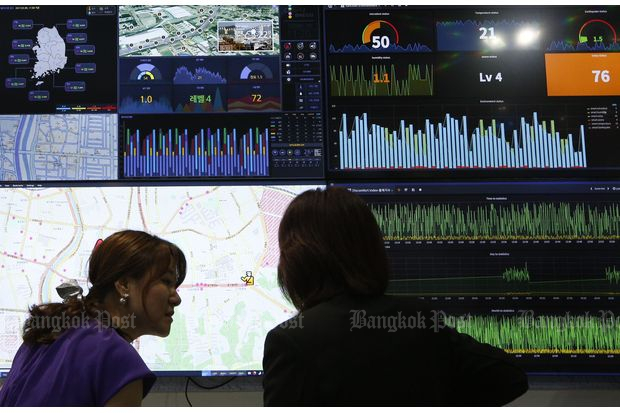The big data of real estate
- Published: 28 Nov 2018 at 10:37 0 comments

(Bangkok Post file photo)
Related Stories
Irrespective of industry, location or client base, technological advancement is indiscriminate in the wave of the disruption it brings. These changes have become the new norm for businesses, and commercial real estate is no exception.
While the gravity of disruptive forces varies across industries, there remains a unanimous element -- technology and more broadly, data. The fusion of technology and data has given rise to a dynamic new sub-sector of real estate -- proptech.
Given its far-reaching effects, proptech has been gaining traction in recent years as one of the biggest game-changing trends in real estate. But while technology has empowered the rise of proptech, it is underlying data that will ensure its proliferation in commercial real estate.
Big data goes by many definitions. It refers to a critical mass of data sets. Functionally, it is responsible for gauging predicative behaviours, trends or customer tendencies.
With the Internet of Things and a plethora of data available, the real estate industry will continue its race to leverage data. Most visible perhaps is the way it harnesses data more strategically to optimise user experiences.
So where does the use of data in commercial real estate in Asia-Pacific and globally currently stand? To answer this question properly, it is important to first understand the real estate industry cuts across a wide spectrum of property-related operations, ranging from brokerage to property management, valuations to workplace solutions.
As such, commercial real estate providers are looking at data sets to build specific solutions and provide more actionable intelligence for clients.
For example, proptech solutions now extend to harnessing data sets, including leasing and sales activity, development site trends, building and asset management data, as well as residential sales and valuation portfolio data.
Digging deeper, more sophisticated workplaces allow users to reserve desks, automatically adjusting the lighting or temperature to individual preferences -- all through an app.
Elsewhere, using the data gathered from meeting room bookings, office usage patterns emerge, enabling facilities management operators to maximise the efficiencies of space.
They will be able to map out peak periods of space usage, and shut down power and water supply when not in use or place unused zones in a low-power mode to maximise energy savings. Considering this, commercial real estate providers are looking at data sets to build specific solutions and provide more actionable intelligence for clients.
To enhance the decision-making process and improve the way to support and advise clients, big data analytics providers are becoming increasingly dependent on demographic and cultural trends. This is especially useful in diverse markets like Southeast Asia.
Nowadays, real estate's relationship with big data focuses more on consumer activity, footfall data, food and beverage consumption activities. Ever broader, geographic data relating to demographics, government infrastructure and macroeconomic data are front-and-centre when designing and implementing proptech solutions for clients. Thus, the use of data in commercial real estate transcends its traditional boundaries.
CBRE, a property consultant which also provides data analytics services, suggests data be referenced against demographics, economic and geographic information. It expects to broaden this solution set but maintains a cautiously optimistic attitude as there are certain pitfalls facing the mainstreaming of big data-driven proptech.
The primary challenge surrounding the use of big data in real estate is how it is interpreted -- intelligently, securely and from an aggregation standpoint. Then comes the understanding of exactly what to do with the data sets, how best to analyse it, and what insights can be extrapolated. And then, of course, the biggest challenge of all: how to ensure it benefits our clients' demands and requirements.
With any large data set comes inevitable questions around security. Proptech is facing the same issues. For any proptech solution, ensuring security, sovereignty and cyber-defence are appropriately in place is essential.
Furthermore, the success of data-driven proptech will hinge on the transparency and reliability of data in certain markets. Before building strategies around analytics, a provider should first ensure that the data are legitimate. Data legitimacy is built on two key pillars -- how readily available and complete data sets are for your industry and how reliable that information is.
Establishing data legitimacy differs by geography. In many western markets, there are whole industries dedicated to the aggregation, cleansing, and on-sale of certain data sets. While in South East Asia, the most reliable data source is often to manually key this information into your local database. As such, being able to effectively acquire information in a standardised manner is obviously a massive hurdle to a big data strategy.
Brought together, big data will play a far more important role in reshaping in global commercial real estate. For providers, capturing big data involving challenges faced by clients allows them to meet their needs proactively rather than reactively.
For the wider real estate industry, there is no better time than now to strategically navigate the sheer volume of available data, appropriately manage its risks and building a suite of services based on intelligent information.
Vikram Kohli is Managing Director of CBRE South East Asia. He can be reached at bangkok@cbre.co.th Facebook: CBREThailand LinkedIn: CBRE Thailand LINE@: CBRE Thailand Twitter: @CBREThailand website: www.cbre.co.th

0 people commented about the above
Readers are urged not to submit comments that may cause legal dispute including slanderous, vulgar or violent language, incorrectly spelt names, discuss moderation action, quotes with no source or anything deemed critical of the monarchy. More information in our terms of use.
Please use our forum for more candid, lengthy, conversational and open discussion between one another.
Click here to view more comments